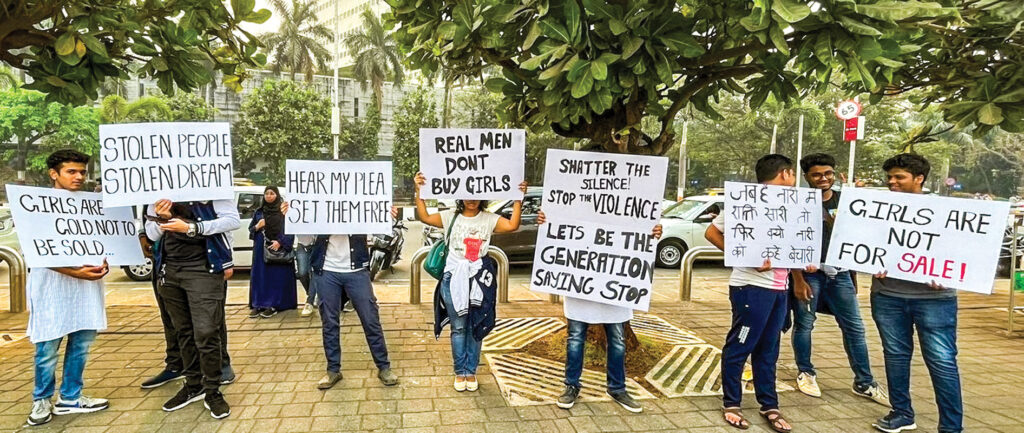It has become a tradition for the Rotaract Club of Jai Hind College, RID 3141, to celebrate women and raise questions on gender equity and the trampling of women’s rights by awareness drives for an entire week around International Women’s Day every March. This year too, under the presidentship of Khushi Shetty, the women’s week (March 1–8) was marked by the project titled Cheekh. “The basic idea of Cheekh (scream) was to perform flash mobs across Mumbai in which we highlight the grievous issue of women’s trafficking. But this year this wasn’t possible because of permission issues. So instead of this hurdle stopping us from observing the week, we came out with alternative ideas and our team took a different approach by engaging in a series of activities to make a powerful statement and introduced new features,” says Khushi.

Four powerful pictures were created, capturing the essence of silenced voices and the plight of those affected by trafficking.
The major objective was to draw attention to the huge problem of women’s trafficking and the sucking of innocent young girls into Mumbai’s flesh trade. To raise awareness on this problem and urge citizens to take a stand against this heinous practice, the Rotaractors decided to put up wall paintings in the Grant Road region near the railway station. Grant Road has “a huge red light area of Mumbai. We sought, and thankfully received, permission from the Mumbai Municipal Corporation to put up wall paintings in this area.”
A wall was utilised as a canvas to depict the oppression and abuse faced by women around the world. “Four powerful pictures were created, capturing the essence of silenced voices and the plight of those affected by trafficking. The artwork aimed to evoke emotions and stimulate conversations, encouraging society to confront a vice like the trafficking of women.”
The week was kickstarted with the club’s Rotaractors organising a parade at one of the Sunday Street spots at Marine Drive. Sunday Street is an initiative of the Mumbai police wherein some stretches of streets in central parts of Mumbai such as Marine Drive, Mulund, Vikroli etc are thrown open to the public for a few hours each Sunday for recreational activities such as yoga, jogging, skating, singing, dancing etc. “The idea is for people of Mumbai to relax and enjoy themselves doing fun activities and people with musical and other talent perform at these spots. These get a huge audience, so we thought why not do a parade at this spot,” she says.
We marched carrying these banners and chanting slogans against female trafficking, and wherever there was a big crowd, we stopped and recited a poem.
— Khushi Shetty, IPP, RAC Jai Hind College, RID 3141
So the Rotaractors prepared huge banners with slogans against women’s trafficking, such as ‘women are not commodities to be sold,’ or ‘real men do not buy women’ and so on. “We marched carrying these banners and chanting slogans against female trafficking, and wherever there was a big crowd, we stopped and recited a poem. The parade aimed to draw attention to this issue, encouraging passersby to reflect on the gravity of the situation and take action.”
The youngsters ran a parallel drive on social media too. The club released a short film on Instagram that drew a parallel between the treatment of girls and that of dolls, “emphasising the objectification and dehumanisation experienced by women in our community. The thought-provoking narrative resonated with viewers, resulting in an overwhelming response. Within a short span, the film reached over 12,000 people, amplifying the message against women’s trafficking and sparking further discussion.”
The Rotaractors have gone further than raising awareness on this issue. “In order to make a tangible difference, our club has joined hands with Rescue Foundation, an organisation dedicated to rescuing girls trapped in the web of trafficking and helping them return to their homes. Recognising the crucial work undertaken by the Foundation, the team organised fundraisers and successfully collected ₹10,100 to support this cause.”
The funds raised played a vital role in facilitating the rescue and rehabilitation of five girls, providing them with a chance to rebuild their lives.
Khushi adds that the funds raised played a vital role in facilitating the rescue and rehabilitation of five girls, providing them with a chance to rebuild their lives. She explains that an NGO in Kandivali called Huge has been started by a crime beat journalist, who wanted to rescue girls from red light areas. The volunteers do sting operations and identify the women/girls who want to get out of the deep hole they have got into. The NGO often has to pay some money to rescue these girls and then they bring them to a rehabilitation centre.

The families are then approached and the situation of the girls is explained to them; “if the family understands, and agrees to take back the girls, it is a happy ending. But unfortunately, many families reject them and these girls are kept in the rehabilitation centre, trained for some skill such as tailoring or starting a small business. The objective is to make them independent.”
The immediate past president of the club is happy that through “Cheekh, our club, where 70 per cent of the members are women, demonstrated the power of collective action and creative expression in combating women’s trafficking. By diversifying their activities, the team engaged with different audiences and fostered a broader understanding of the issue. Their efforts in raising awareness, sparking conversations, and actively contributing to the rescue of victims exemplify the club’s commitment to social change.”
(Concluded)









